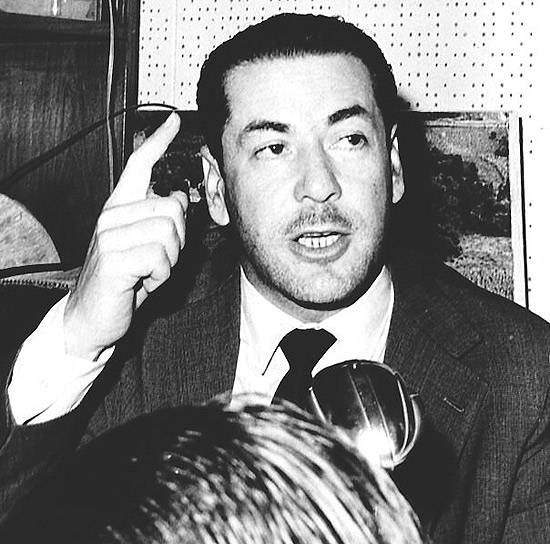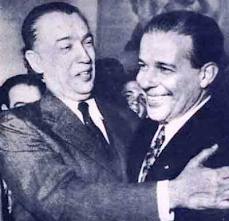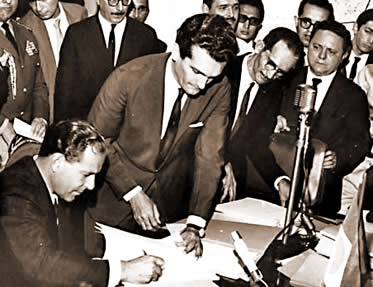Back to Normal
-The Country completely overcame the coup attempt. Today we are celebrating five months of Victory Day. The population is united with me in the defense of democracy.
-President, the latest poll by Ibope indicates that its popularity continues to grow. The reforms you are advocating are also gaining support, criticisms of your government are increasingly restricted. What do you attribute to this series of positive news?
Opening of Jornal de Vanguarda
It was September 2, 1964, and the President transmitted a message of normality to the country. That day was broadcast, in color, his interview in the Jornal de Vanguarda, presented by Fernando Barbosa Lima.
In those five months that had passed, they all painted the scenery of a normal and united country. The greatest risk the government had run in this period was when General Amaury Kruel discovered that Jango would not keep his promise of war.
Officially the mood subsided, but Kruel soon backed the opposition to Goulart, building behind him an anti-communist alliance against Jango. As for the United States, the President kept his early promises, and even the official trip to Washington was already being planned.
Another factor that aggravated Goulart's opposition was the strong influence of Leonel Brizola on the government. Under his influence, President Goulart spoke again in defense of the basic reforms. This time, without the hard-line military opposition and with the conservative elite weakened, popular adherence to reforms quickly grew.
Leonel Brizola, strong man of the Goulart Government after the coup
Despite encouraging reforms, Jango tried to establish himself clearly as a Democrat and not as a Communist. The president's two priorities were Agrarian Reform and Educational Reform.
Goulart also sought to harness his momentum of popularity to lay more solid foundations on popular affection. He invested and injected large amounts of money into TV Excelsior, from the great supporter Mário Wallace Simonsen. He has spoken in every corner of the country, appeared in interviews and radio and television advertisements every week. He made his approach to popular characters, such as former President Juscelino Kubitschek.
And perhaps the most satisfactory of its measures: the greater use of the image of the First Lady. Of discreet woman, Jango elevates his wife to an aspirant Evita. She participated actively in rallies alongside her husband and even alone, meeting with Governors and Senators, actively defending her husband's reforms. Soon the young and beautiful Maria Thereza became one of the best-known faces in the country.
Maria Thereza, the favorite cover of every magazine
-That positive news means the people's support. People know that reforms will only benefit them. Senator Pedro Ludovico is articulating with the Government in Congress so that the reforms are in full swing before the next election.
The Senator Pedro Ludovico Teixeira had been chosen in the President of the Senate, after the resignation of Auro de Moura Andrade. Pedro Ludovico was the father of Jango's ally and Governor of Goiás, Mauro Borges Teixeira.
Senator Pedro Ludovico, President of the Senate
-Then we come to the key. The next election. Will you be a candidate for re-election, President?
Laughing, Jango fumbled.
-The Constitution is clear, the President can not run for re-election.
-But you were not elected President, I say, not for the office of President. You were elected to the vice-presidency, technically it would not be a re-election.
-This would be a rather controversial interpretation of the Constitution.
-But with your popularity. And with Senator Pedro Ludovico in charge. This reading could be authorized by Congress.
-I'll make it clear here for the whole of Brazil. I will not contradict the Constitution and be an irregular candidate.
-And if you're not a candidate? Who will support your succession?
-I'll be totally neutral. Election is a democratic process in which the President should not interfere.
-President, I must thank you for your participation and leave here open the invitation to interview First Lady Maria Thereza. Viewers are begging.
-Fernando, my wife will come to your program with pleasure. Thank you for the opportunity to talk a little with this Brazil and spread the Reforms a little more.
-Thank you, Mr President. And now, following the schedule of Excelsior TV, Moacyr Franco Show!








